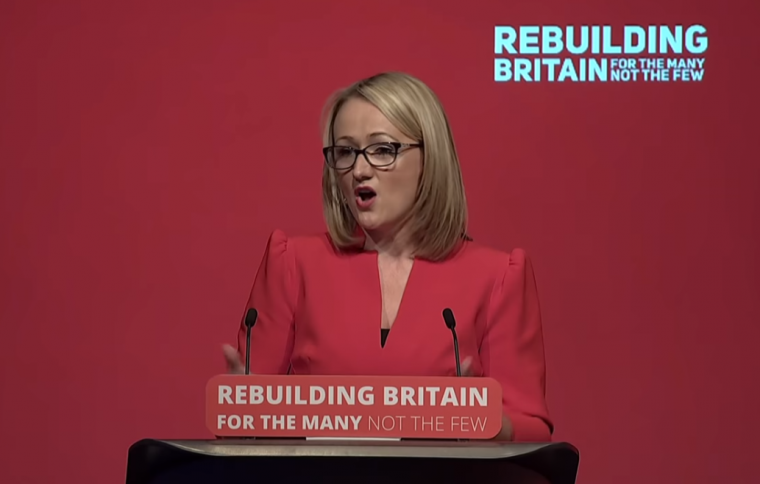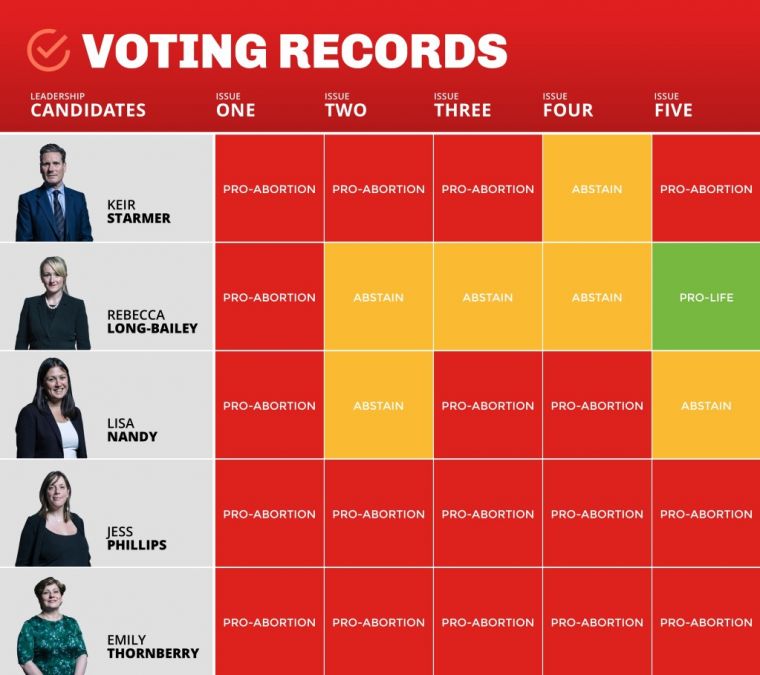Where do all five Labour leadership candidates stand on abortion?

The current Labour leader is standing down after Labour lost its fourth general election in a row last month.
After announcing plans to introduce abortion, for any reason, up to birth, Labour suffered their worst electoral defeat since 1935.
The five candidates standing to be the leader of the Labour Party include Sir Keir Starmer, Rebecca Long-Bailey, Lisa Nandy, Jess Philipps and Emily Thornberry.
Sadly, all five candidates voted in favour of imposing Europe's most extreme abortion law on Northern Ireland as illustrated in the graphic below.

Issue one: Amendment to impose law change on Northern Ireland to introduce abortion (09-07-2019)
Issue two: Amendment to pressure the Government to change abortion legislation in Northern Ireland (24-10-2018)
Issue three: Introduce abortion on demand, for any reason, up-to 24-weeks in Northern Ireland (23-10-2018)
Issue four: Introduce abortion on demand, for any reason, up-to-birth in England and Wales (13-03-2017)
Issue five: Legalise assisted suicide (11-09-2011)
The pledges include:
- Introducing abortion up to birth, for any reason to the UK
- Opposing any attempt to reduce the abortion time limit
- Supporting the introduction of buffer zones around all hospitals and clinics providing abortion 'services'
- Supporting making the 'morning-after pill' available for free from pharmacies, including for under 16s
- Remove the two doctor clause
- Require doctors to register their conscientious objection
- Introduce a legal requirement for hospitals to provide abortion 'services'
The 57-year-old shadow Brexit secretary is, as of writing, the bookmakers' favourite to become Labour leader and received the most backing in the first stage of the contest, securing 88 nominations.
However, before becoming an MP in 2015 Sir Keir Starmer made some startling revelations over his abortion stance while he was the UK's Director of Public Prosecutions.
A month before quitting as the head of the Crown Prosecution Service, Sir Keir ruled against the prosecution of two doctors who were secretly filmed arranging sex-selective abortions in a Telegraph exposé. The CPS stated it was not in the "public interest" to prosecute the individuals.
In a letter explaining his decision to the Attorney General, Dominic Grieve, Sir Keir said that the 1967 Abortion Act "does not… expressly prohibit gender-specific abortions." He also noted that in In many cases doctors approve abortions without even meeting their patient.
Ahead of the election, Sir Keir signed a pledge from the UK's largest abortion provider, the British Pregnancy Advisory Service, to support a change in law that would introduce abortion for any reason up to birth – the only leadership candidate to have done so.
Since then he has also said abortion should not be a "criminal law issue".
Speaking during a visit to a nursery in Batley, West Yorkshire, he said: "It should be a matter of a woman's right to choose. I want to see this reviewed and changed. We need to take criminal law out of it."
Sir Keir voted in favour of Rob Marris' assisted suicide bill which was roundly rejected by 330 votes to 118, in 2015.
The 40-year-old shadow business secretary received the second-highest number of nominations, with the backing of 33 Labour colleagues.
Rebecca Long-Bailey was under fire yesterday from Labour party supporters on social media after it was widely reported she does not support disability-selective abortion after the standard limit of 24 weeks.
Currently, disability-selective abortion, for conditions including Down's syndrome, cleft lip and club foot up to birth, is legal for any reason up to birth while the upper limit is 24 weeks if there is no disability.
However, since then, a spokesman for Long-Bailey has 'stressed' to the Guardian that she "unequivocally supports a woman's right to choose" and highlighted her vote in favour of in favour of imposing Europe's most extreme abortion laws on Northern Ireland.
In the same questionnaire, Long-Bailey claimed she would "never contemplate abortion" but has since then tweeted about her "unequivocal support" to a host of pro-abortion pledges listed in an open letter to Labour's leadership candidates. She tweeted: "For the avoidance of doubt, I unequivocally support this. Some pretty grubby attempts over the past 24 hours to deliberately misrepresent my position".
She has been absent from most votes on abortion since her election, in 2015.
That same year, she joined a majority of 212 MPs in voting against a Bill to introduce assisted suicide, in the UK, in 2015.
The 40-year-old MP for Wigan gained 31 nominations from fellow MPs and MEPs.
Under Jeremy Corbyn, Lisa Nandy initially stayed in the shadow cabinet as an energy spokeswoman, but later resigned in protest at his leadership, saying he was "unable to form a broad, inclusive shadow cabinet that draws on the best of our movement's left and right traditions".
Lisa has remained relatively quiet on abortion since becoming an MP in 2010, but her voting record displays her pro-abortion stance. Additionally, yesterday, she tweeted her full support to a host of pro-abortion pledges listed in an open letter to Labour's leadership candidates.
Lisa has voted against an explicit ban on sex-selective abortion, against mandating abortion clinics to offer free independent counselling and to impose an extreme abortion law in Northern Ireland.
Lisa missed the vote on Rob Marris' assisted suicide bill, which was defeated.
The 38-year-old Birmingham Yardley MP secured 23 nominations to make the current contest round – just one above the threshold.
In the same article, she attacked pro-life Conservative MP Maria Caulfield for wanting to start a debate on reducing the time limit on abortion to 12 weeks.
Jess celebrated Westminster's decision to impose Europe's most extreme abortion law on Northern Ireland, telling BBC Radio 1 Newsbeat: "We're not doing this as Westminster overlords. We are doing it because hundreds and hundreds of women from Northern Ireland have requested that we fight for their rights."
In 2017, she voted to introduce abortion on demand, for any reason, up-to-birth in England and Wales.
Jess Phillips also voted in favour of Rob Marris' defeated assisted suicide bill.
The 59-year-old shadow foreign secretary was the first contender to throw her hat into the ring, but the last to get enough nominations – making 23 just 10 minutes before the voting closed.
Emily Thornberry has voted against an explicit ban on sex-selective abortion, against mandating abortion clinics to offer free independent counselling and against a law requiring parents of girls 15 and under are notified if their daughter is seeking an abortion.
Like all other leadership candidates, Emily voted last year to impose an extreme abortion law in Northern Ireland. Unlike other candidates, there is evidence of Emily backing the imposition of abortion laws on the province as far back as 2008.
Emily Thornberry was absent in 2015 for the vote on Rob Marris' rejected assisted suicide bill.
How the leaders will be decided
- 13 January: Nomination period closes
- 15 January – 14 February: Second stage of nominations from Constituency Labour Parties and affiliates, including unions
- 18 January: The first of seven scheduled hustings takes place in Liverpool
- 20 January: Voting eligibility for new Labour Party members and affiliated supporters is frozen
- 16 February: The last scheduled hustings is held in London
- 21 February: Ballot opens for leadership candidates
- 2 April: Ballot closes
- 4 April: Special conference to announce results
















